Follow the Leaders
10 Attributes Of a Great CEO Peer Group Member
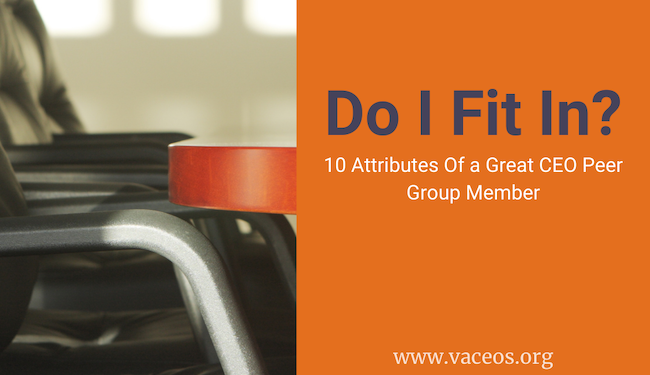
It’s no secret that CEOs of small and mid-sized businesses get a lot out of their peer advisory roundtable groups. Roundtables supply diverse perspectives in a confidential environment and are proven to deliver advantages in decision-making and leadership, especially during challenging times.
To ensure the roundtable performs at its greatest potential, I’ve found that those participants who receive the most from the process tend to share certain qualities.
They are, in no particular order:
- Intellectual curiosity. A desire to know what makes things work, the “back story”, answers to “why”, getting to the “root cause”.
- Life-long learner.
- Open to seeking the input of others, and willing to implement suggested solutions not your own.
- Committed to the process of continuous improvement. Not satisfied with the current state. Growth-oriented.
- Embrace change. An innovative spirit.
- Strategic thinker.
- Self-aware. A willingness to be vulnerable, to be transparent.
- Secure. No inherent need to be the smartest person in the room.
- Humble. More concerned about being able to give as much as you’re getting, as opposed to getting as much as you’re giving.
- Appreciate the power of diverse backgrounds, world views, perspectives, and experiences.
These attributes, in fact, define our members to a tee!
Is it necessary to have all of these attributes to maximize the benefit of peer group membership? No. Would it be helpful to have some of them? Definitely. More important is attitude, your approach to the process. We all get the same 24 hours per day. The only thing that we can control is how we utilize, leverage, and prioritize those 24 hours.
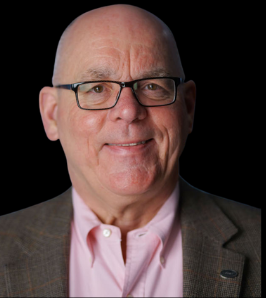
About the Author
Keith Hartman, Regional Executive for Virginia Council of CEOs (VACEOs), has over five years of experience developing and supporting peer-to-peer roundtables and forums for Vistage Worldwide, the international leader in peer advisory groups and personal leadership development for CEOs and senior leaders. He has experienced first-hand the transformational impact that the sharing of challenges, opportunities, and experiences with trusted peers in a confidential environment can have, and is looking forward to helping the Council expand this concept to all corners of the Commonwealth. Learn more about Keith.
Related article:
3 Reasons Why Marie Antoinette Lost Her Head (and how today’s CEOs can learn from it)

“Let them eat cake,” famously rumored to be said in the 17th or 18th century by princess Marie Antoinette upon being told that the French peasants had no bread. Whether she actually said it or not is unsure, but it does offer small business CEOs a few lessons in leadership.
3 Reasons Why Marie Antoinette Lost Her Head
#1. Losing touch
Knowing your audience is important. As a leader, you have to be mindful of your words to avoid a potential faux pas. Immerse yourself in the wisdom of others and find better ways to handle sticky situations.
#2. Running from crisis
Respect is earned by facing problems head on. Managing confrontation is unfortunately part of the job and must always be handled tactfully. Have a trusted friend by your side.
#3. Guillotines
The world is quick to judge and it doesn’t take much for tempers to flare. You’ve done everything in your power, but are truly struggling to fix the issue at hand. Fortunately for you, we know people who can help. It will be alright.
BUT WHAT IF SHE’D HAD BETTER FRIENDS IN HER CORNER?
Life is full of missteps and mistakes. A smart leader will observe others, absorb their wisdom, and navigate through new territory much easier.
Our CEO members find that with the backing of their peers, they evolve faster and achieve more together. Listen in to what they have to say.
Do As the Romans Do Not

3 REASONS WHY AN EMPIRE CAME CRASHING DOWN
(and how today’s CEOs can learn from it)
#1. Internal Conflict
Making an entire empire happy seems impossible. As the leader it can be draining. What if there’s a way you haven’t thought of? You’ll never know without immersing yourself in the wisdom of others with similar challenges.
#2. Wandering Values
As the empire evolves, so does its goals. The trick is to never let these goals interfere with, or take priority over a solid foundation of values. Having trusted peers as friends helps us keep sight of what matters most.
#3. Barbarian Tribes
Competition is slightly more civil these days. Regardless, it’s important to keep your spears sharp and stay aware of your surroundings. It’s easier to hear the rumblings of potential threats when you have alliances on the outside.
BUT WHAT IF THE EMPIRE HAD THE RIGHT SUPPORT?
Our CEO members find that with the backing of their peers, they evolve faster and achieve more together. Listen in to what they have to say.
CEO Roundtable: How to Get the Most Out of The Experience
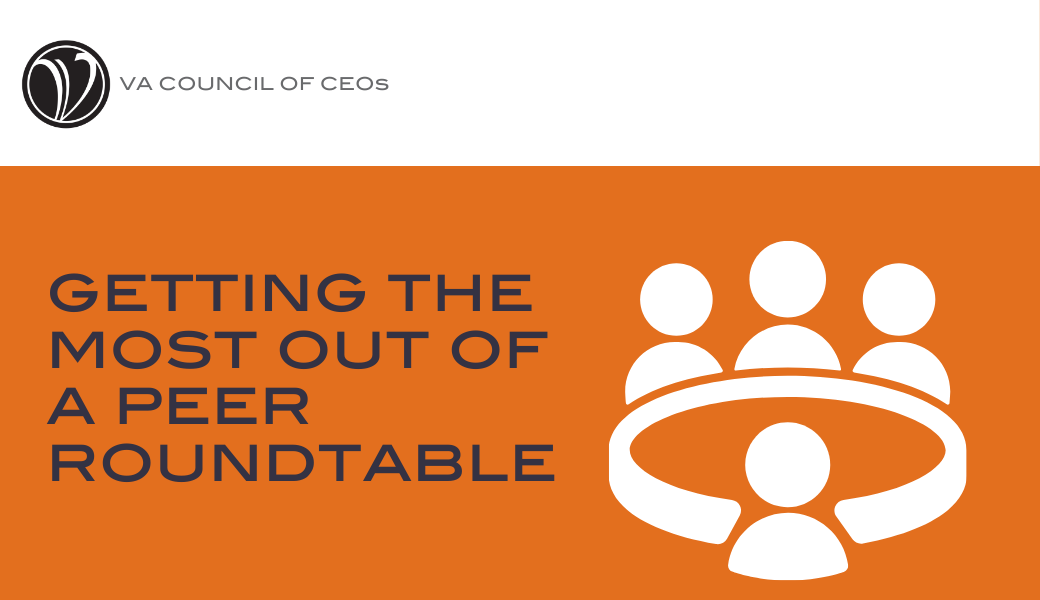
I recently came across a terrific article in CEO World Online Magazine written by Leo Bottary. Leo frequently writes for the magazine, and he is listed to be a member of the External Advisory Board (EAB) there. He is a staunch advocate for peer groups, and I follow his work closely.
Still, there is a nuance within a recent post about CEO roundtables where we differ.
In his post “The Power of We Begins with You,” he writes: “After four years of helping new and experienced peer advisory groups squeeze the most value out of their time together, two findings have consistently emerged. First, the strength of the overall group rests in the hands of its members. Second, there are three things members can do to up their game to everyone’s advantage: Show up. Step up. Follow up.”
I liked his explanation about showing up, writing in part: “If you believe that 80% of life is about showing up, then understand that to be an outstanding member, it’s that and then some.” Stepping up is about being prepared and bringing your A-game.
The Follow Up action is where I begin to disagree with him, but I do see where he is going. His example is based on a scenario where advice is given in a roundtable session.
Our roundtable meetings at VA Council of CEOs are purposely designed not to function that way. Giving advice is forbidden.
The VACEOs Roundtable Way: No Advice, Only Experience Sharing
“Learning to participate in a group [using Gestalt Language Protocol] takes effort and practice, but it’s essential for creating a safe, rewarding experience. By avoiding advice, VA Council of CEOs peer roundtables allow CEOs to connect more deeply, creating more opportunities for growth.”
Scot McRoberts, Executive Director, VA Council of CEOs.
All VACEOs Roundtables adhere to a set of ground rules by which the group must abide. Chief among them is strict adherence to a code of confidentiality and Gestalt Language Protocol.
“The Gestalt Protocol is based on the theory that as children we were always told what to do by our parents,” explains Mo Fathelbab, Forum Resources Network president and author of Forum: The Secret Advantage of Successful Leaders. “As a result, adults – especially entrepreneurs – resent being told what to do by anyone.”
The guiding principle of the protocol is to never give advice but to share related experiences instead. Participants are careful to avoid phrases such as “If I were you…” when another group member presents his or her challenge.
Learning to participate in a group this way takes effort and practice, but it’s essential for creating a safe, rewarding experience. By avoiding advice, VA Council of CEOs peer roundtables allow CEOs to connect more deeply, creating more opportunities for growth. (Read more here.)
CEO ROUNDTABLES OFFER “INCALCULABLE VALUE”
One thing is clear to both Leo and me. Peer groups that are confidential, highly structured, and based on trust is a powerful tool for the small business owner.
Said one VACEOs Member but echoed by many: “I was looking for a peer group to help guide me as I tried to guide the firm to places we’d never been before. And I can honestly say it’s been one of the best things I’ve ever done.”
Does it take commitment? You bet. Those who choose to join a peer advisory organization understand it’s an investment in their professional development that will generate a worthwhile return.
Or, as Leo so eloquently writes in his post: “The reason you’ve been invited to enjoy the privilege of being part of a peer advisory group is because there is an expectation you will bring value to the other members. You’re not there to fill a seat; you’re there to make a difference. Once you accept that responsibility as seriously as how you see your role at your own company, you’ll be on the path to receiving the kind of incalculable value you can only get from a group of your peers.”
I could not agree more!
You can read Leo Bottary’s post here.
About the Author
Scot McRoberts is the executive director of the VA Council of CEOs (VACEOs). One of the original co-founders, he has led the organization’s growth from 20 members in 2000 to more than 200 today. Utilizing a best practice model for the Council’s CEO roundtables and a dogged focus on its core purpose of connecting CEOs for the purpose of sharing experiences, McRoberts has developed an association that boasts 90% retention. Before coming to VACEOs, Scot was a senior executive at the Greater Richmond Chamber of Commerce, where he led business councils, small business programs, and business retention efforts.
5 Reasons NOT to Join a CEO Peer Roundtable Group
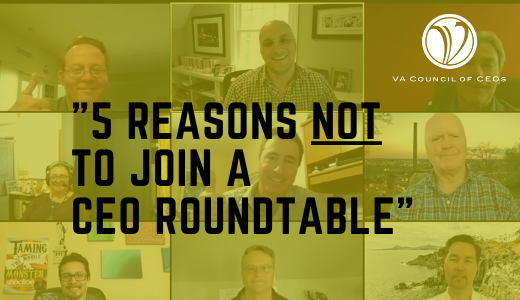
It’s no secret that CEOs of small and mid-sized businesses get a lot out of their peer advisory roundtable group. Still, some say it’s not for them. Here’s why.
#1: “I DON’T HAVE THE TIME TO COMMIT TO A ROUNDTABLE MEETING”
If you run a small or mid-sized business, time is precious and time is money. Committing to a regular meeting with your CEO peer roundtable group could mean 4 hours a month AWAY from other activities.
The truth is, the CEOs who participate in a roundtable group have no more time than those who aren’t in one. The difference is, they choose to focus on the return they get from the confidential experience. For example, an independent study by the Knowledge Advisory Group surveying VA Council of CEOs Members suggests that CEOs and business owners in peer roundtables make better decisions and grow faster.
Simply stated, these leaders have chosen to carve out time to work ON the business rather than in it.
#2: “MY BUSINESS IS UNIQUE, I WON’T GET ANYTHING OUT OF IT”
Having a unique business is actually a nice benefit, and in fact, the best roundtables are carefully assembled to achieve the highest degree of diversity possible. And that’s great news for everyone as it can be easy to be siloed in your particular industry or niche, or be so close to your business that you fail to see potential solutions or opportunities. The peers sitting around the table will offer a variety of perspectives focused on similar issues or opportunities that creates those “blinding glimpses of the obvious”.
#3: “I’M CONCERNED ABOUT CONFIDENTIALITY”
As the leader of your company, there are things that you can’t discuss within your organization. Most likely, there are things that you can’t even discuss with your banker, your attorney, your accountant, or other trusted advisors. It can be a lonely place, being a CEO.
A CEO roundtable is specifically designed to help remedy that “lonely” feeling. It is a highly confidential, “safe space” where the competition is not present. Nothing is shared beyond the group. This frees up everyone to be totally open and transparent with each other about business (and oftentimes personal) matters.
#4: “EVERYONE’S GOT AN ANGLE”
Not in a peer roundtable. The sole agenda item on the part of every member of a group is to help their fellow member through shared experiences and the lessons that they have learned from their journey. They know that in return their fellow members will have a similar focus.
#5: “I DON’T HAVE THE BUDGET”
The cost to be a member of a peer advisory organization like Vistage, EO, or VA Council of CEOs (VACEOs) varies greatly. An international organization like Vistage can cost more than $12,000* a year. Conversely, VACEOs membership dues are a quarter of that, largely because the organization is a nonprofit that keeps its overhead low to maximize the member experience per member and sponsor dollar invested.
The bottom line? Those who choose to join a peer advisory organization understand it’s an investment in their professional development that will generate a worthwhile return.
*Learn more at: “EO vs Vistage vs VA Council of CEOs: Which is Right for Me”
Virginia Council of CEOs (VACEOs) is a nonprofit organization connecting CEOs for learning and growth. Formed more than 20 years ago, Member benefits include placement in a peer roundtable group and access to a thought leader network, and a robust program of events for learning and growth. This is not a networking group, but rather a group of CEO peers who are invested in the success of each member.
Learn more at www.vaceos.org.
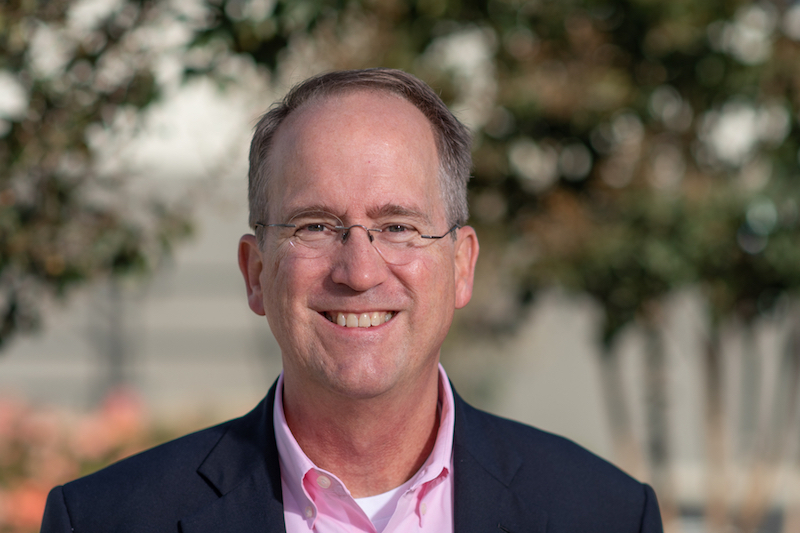
Recent Comments